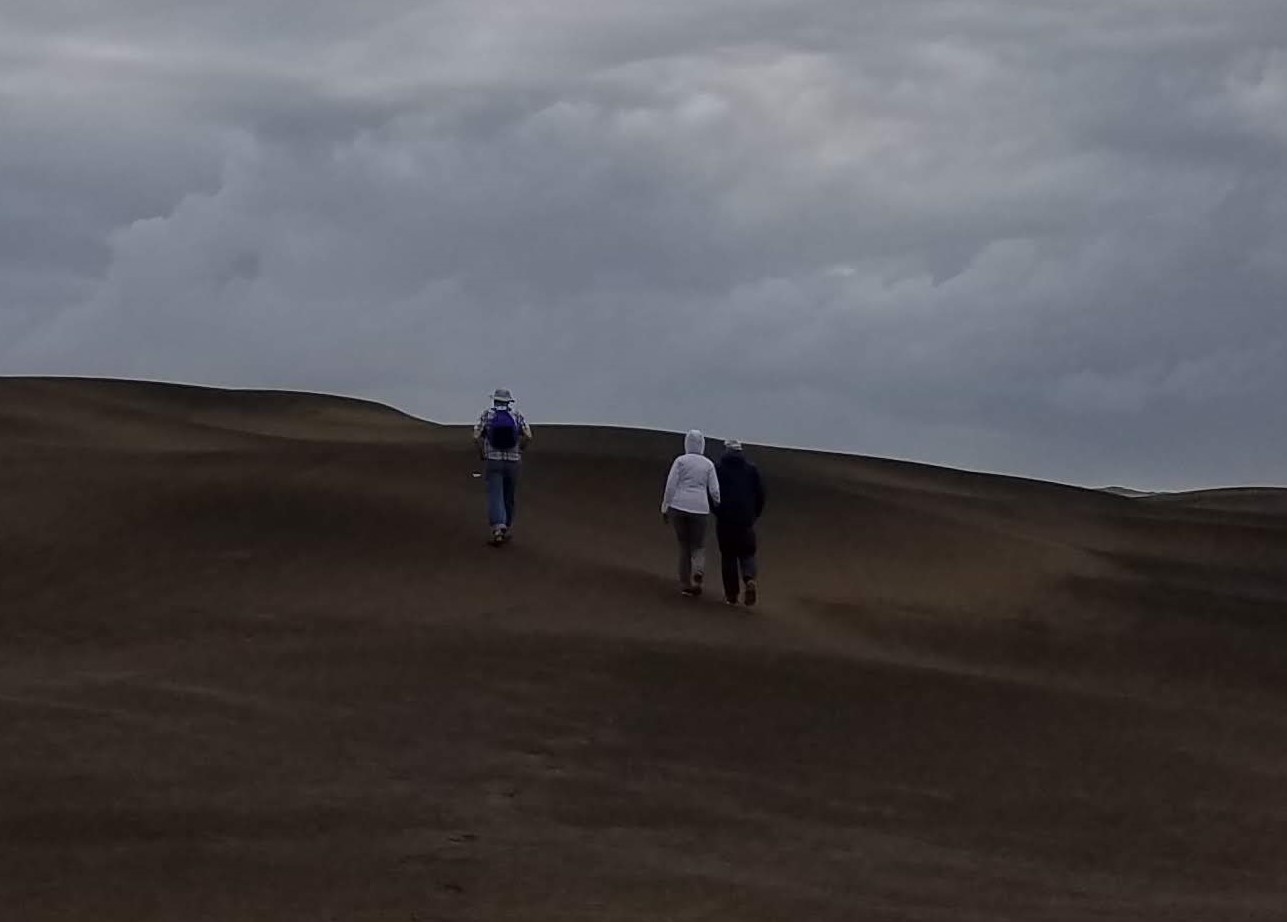
Because it had rained earlier in the day and the sand was packed, walking across the extensive dunes at Port Waikato wasn’t as hard as it could have been
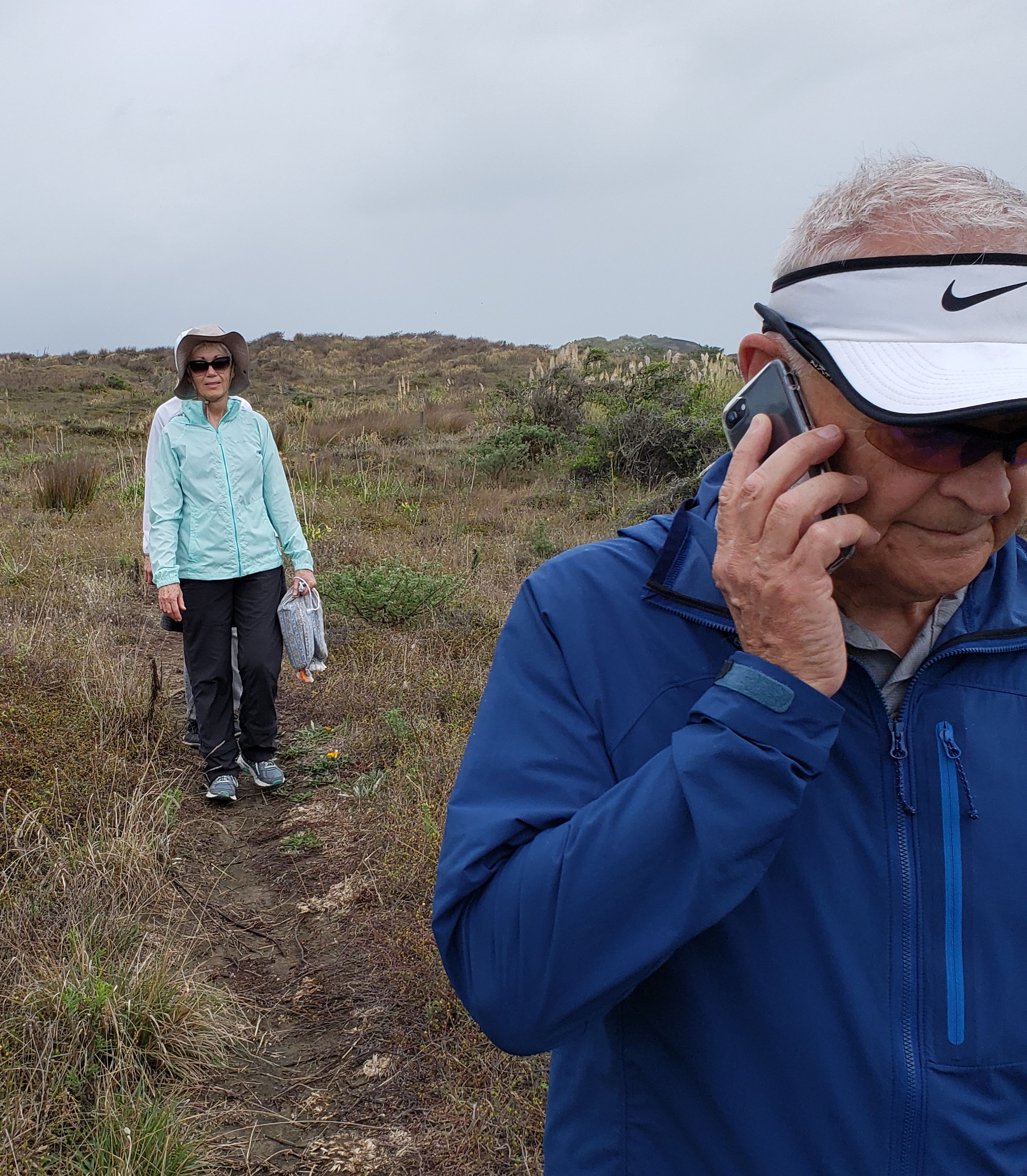
Barry on the phone with Rangi
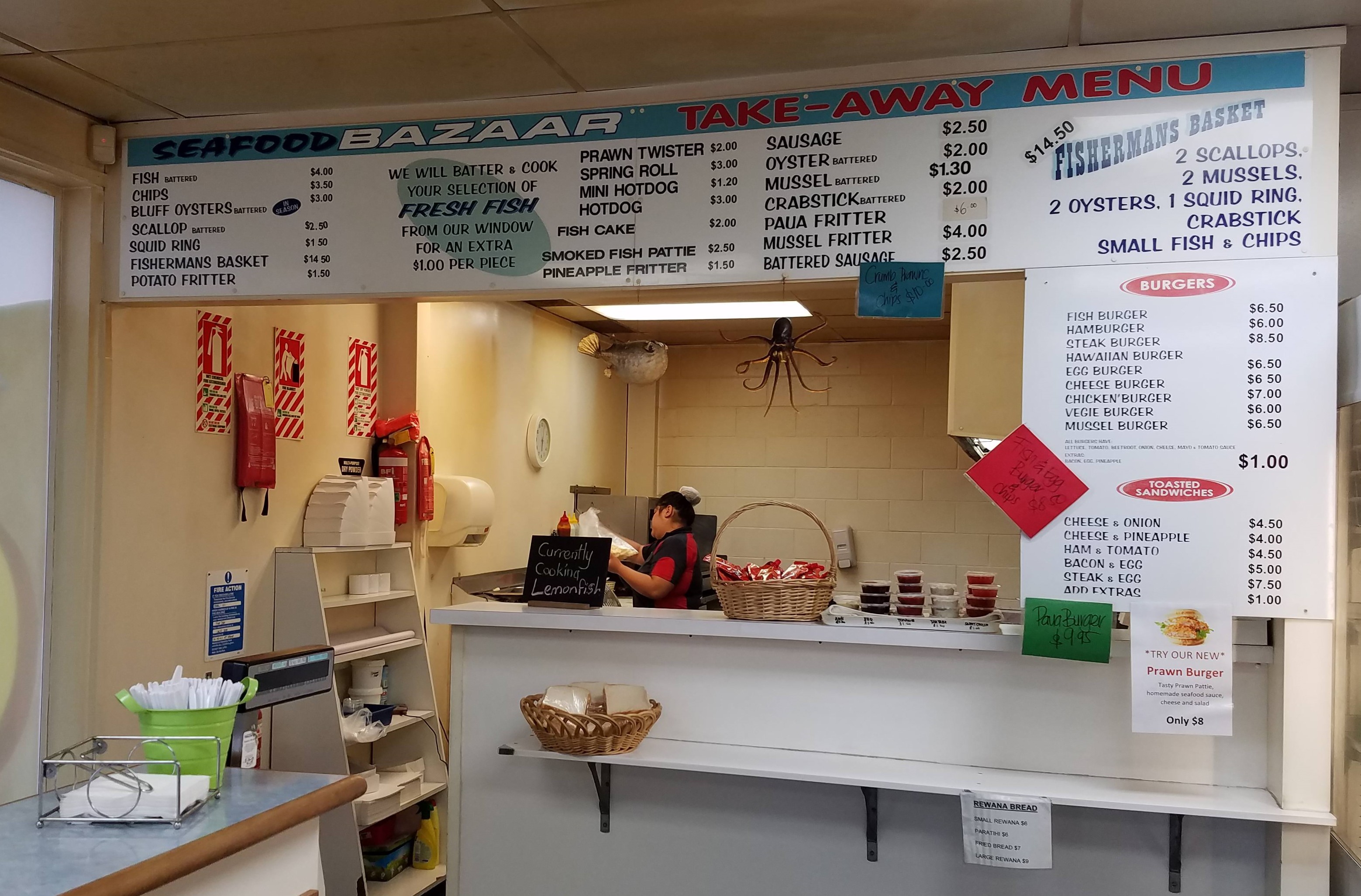
On our way home from Port Waikato, we picked up fish and chips at the Seafood Bazaar. The takeaway window would be closed the next day
Late in the afternoon during our Monday excursion on 23 March, as we were an hour into our hike across the sand dunes at Port Waikato in company with Elder and Sister G, Barry’s phone buzzed. We were surprised that he was still getting a mobile signal so far from civilization, and then dismayed to learn from the caller (Rangi) that the prime minister had just announced that beginning at 11:59 p.m. on Wednesday 25 March, New Zealand would move to Level 4 in its response to the COVID-19 pandemic.
At that point, the country had been at Level 2 for a few days, which meant that large events had been canceled and public gathering places had closed; people were advised to practice social distancing, but schools and most businesses were still open. On 12 March, The Church of Jesus Christ of Latter-day Saints had announced that it was suspending all church meetings and activities worldwide, instructing members to worship as families rather than as congregations, so we Church History missionaries had already begun to consider how to proceed when the inevitable local restrictions began. We had decided to close the Matthew Cowley Pacific Church History Centre to the public beginning at regular closing time last Saturday, and Elder G had recommended that the four local part-time service missionaries who work at the Centre should stay home until further notice, mostly because three are over 70 and some are already in fragile health. However, the seven American full-time missionaries had planned to continue working at the Centre, even if we had to split up and work in separate parts of the building. Closing to the public would be kind of a blessing, we decided, allowing us extra time to catch up on the backlog of projects each of us has.
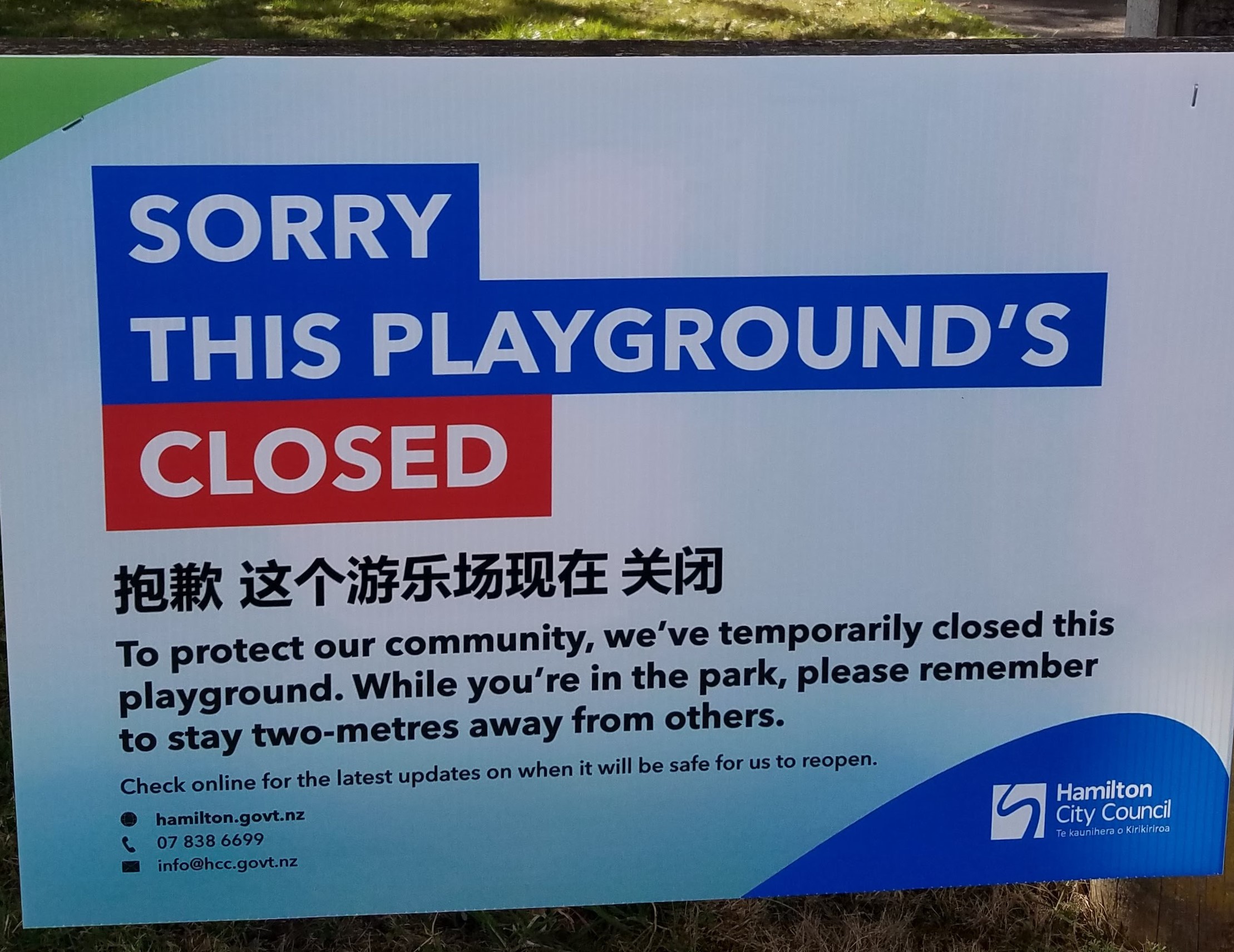
All community playgrounds, as well as nonessential businesses, will be closed for at least four weeks
But moving to Level 4 in New Zealand meant the complete closure of all nonessential businesses, and confinement to our own households for at least four weeks. Indeed, even before we even got back to Hamilton from Port Waikato, Barry had received word from the Church’s Pacific Area office that no one is to work at the Centre at all, and by Tuesday morning we had been told that all our electronic keys to the building will be disabled so we won’t be tempted to sneak in to use materials or equipment, even if we go in alone.
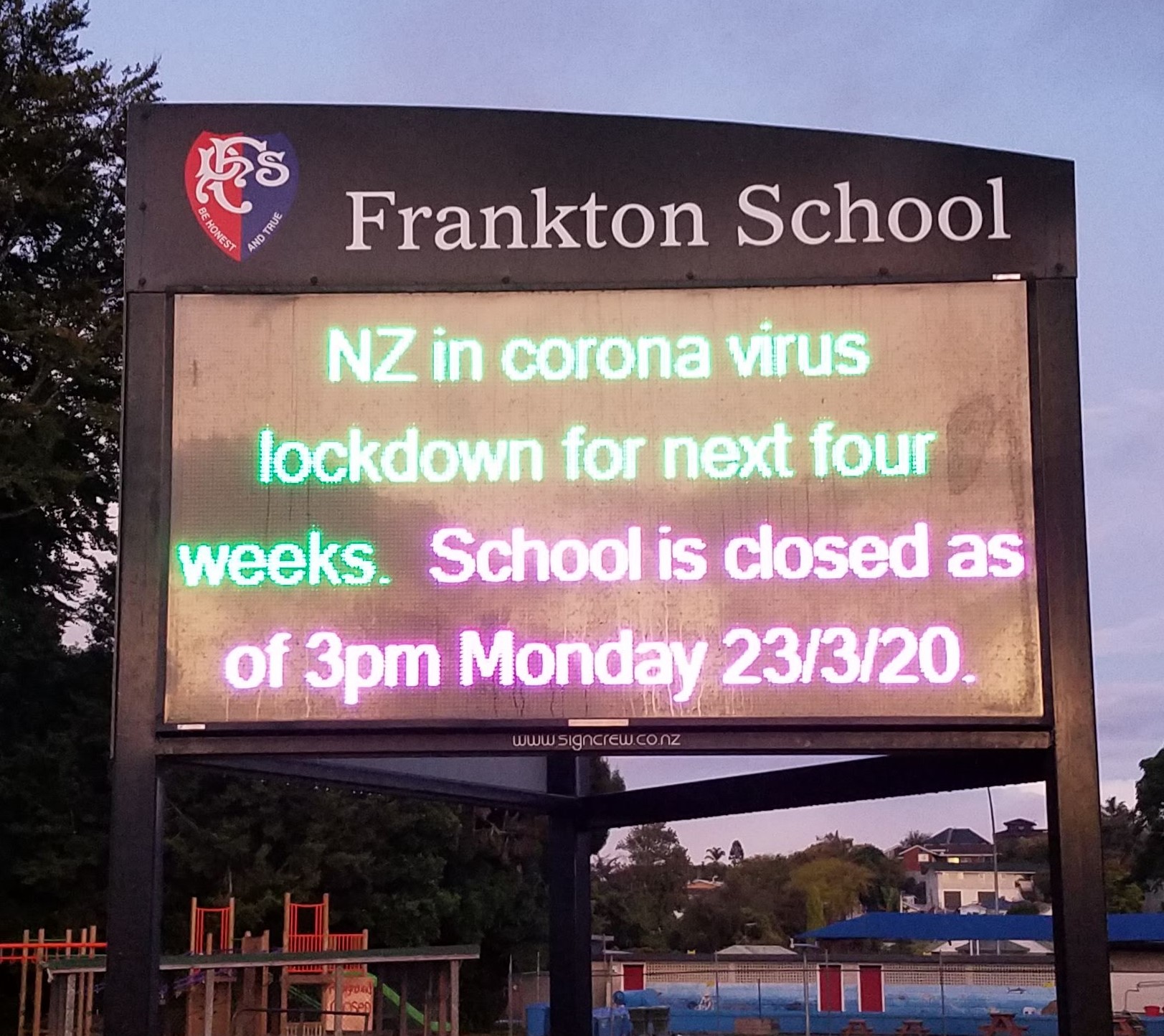
Schools were closed by the time the lockdown was announced
Having learned during the previous week that the Church had begun sending senior missionaries home from many parts of the world, often with only 24-hours’ notice, but having heard nothing from the Church’s Pacific Area authorities about our own disposition, the Americans at the MCPCHC were wracked with uncertainty. None of us wanted to be sent home, loving our work in New Zealand, and feeling that we were safer here than on a plane full of people from who knows where, heading to a country where—according to our family and friends—chaos reigned. We pleaded with Jared, the Church History Department’s representative in the Pacific Area office, to advise the Area presidency that we were prepared to stay in Hamilton, and that we had plenty to keep us “anxiously engaged in a good cause” even if we could not continue working at the Centre. Jared secured permission from the Area presidency for us to stay, but he reminded us that if the general authorities over the Church History and Missionary Departments decided to send us home, we would have to go back to the U.S. whether we wanted to or not.
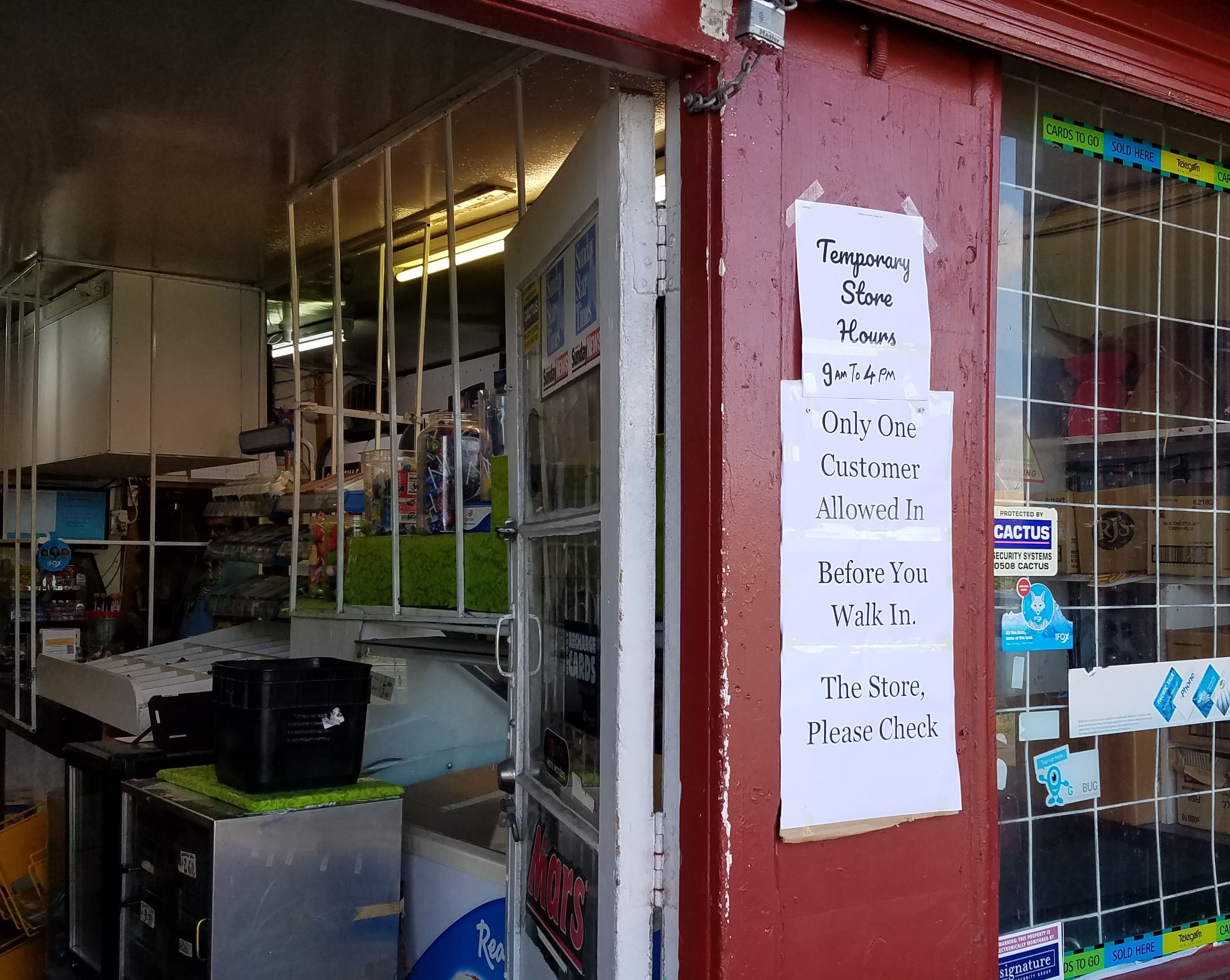
Our neighborhood dairy (convenience store) takes necessary precautions
Our friends Tara and Todd, serving a Family History mission as digital preservation specialists at the Danish National Archives in Copenhagen, had told us that on 12 March, they had attended a mission zone conference at which everything proceeded normally except that all missionaries were advised to buy a two-week supply of food in case they had to remain at home to avoid contracting COVID-19. So the next morning, Tara and Todd went shopping for their two-week supply. Shortly after they got home from the store, they received word that they should pack their bags and be prepared to fly home within 24 hours. Two frantic days later, they were back in the U.S., where they were released from their mission several months early. Similar scenarios were playing out among senior missionaries everywhere from Japan to Germany, and we had no guarantee that we here in Hamilton would be exempt from the recall. We didn’t know whether to buy a two week supply of food or prepare to go home, and the uncertainty was wearing on all of us. Yet, we persisted in believing that the Lord would allow us to stay.
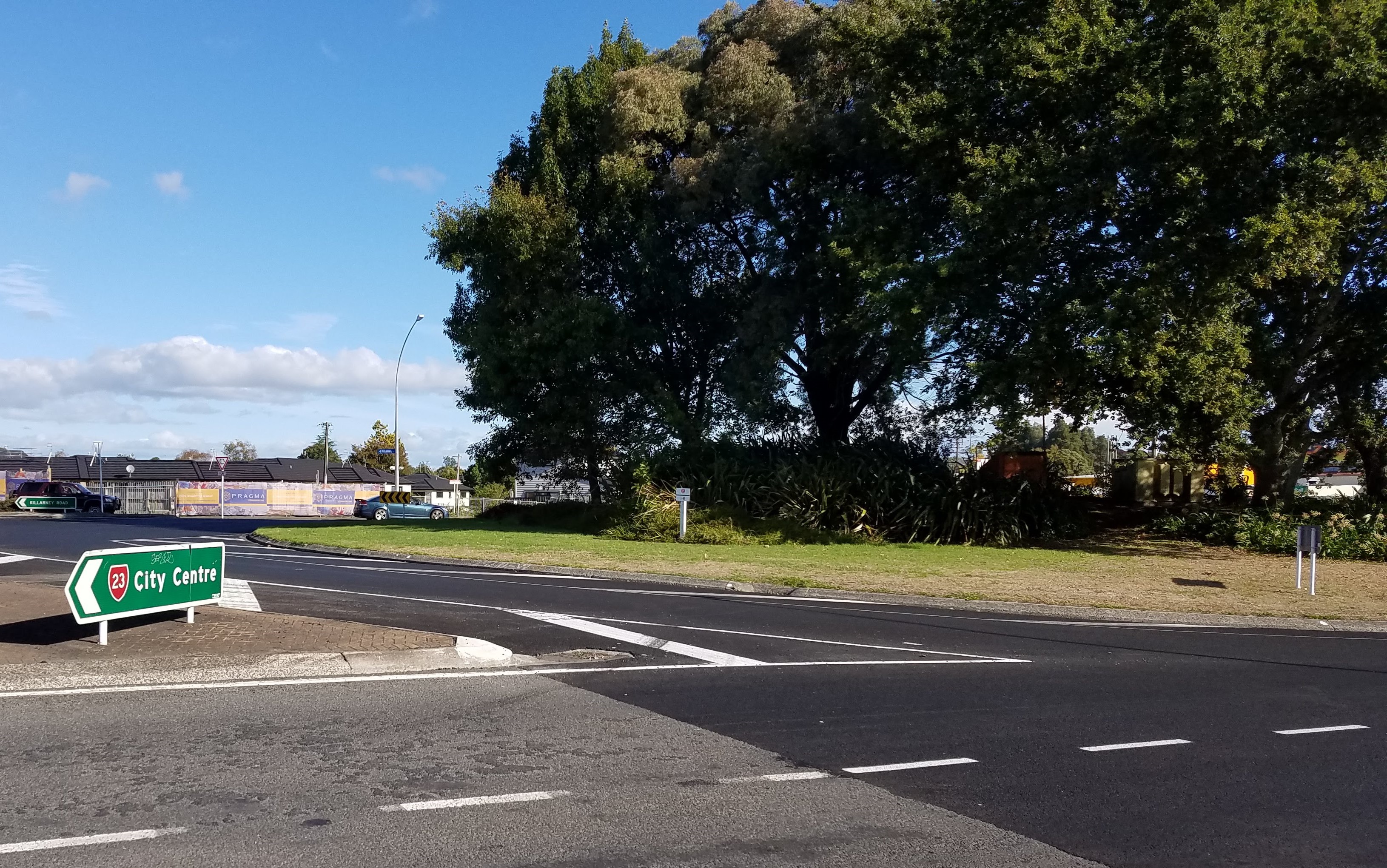
Kiwis have been remarkably compliant with government regulations thus far. Navigating this roundabout at rush hour on a normal Thursday afternoon is treacherous, but at 5 p.m. on the first day of Level 4 restrictions, it was nearly deserted
On Tuesday morning, during our regular virtual meeting with the Church History Museum team in Salt Lake City, we discussed how they were handling the closure of their own museum and preservation facilities, and what they had done to prepare to work from home. Reminding us that the only historical records we will be able to access outside the MCPCHC are those that have been digitized already, the CHM team assured us that even if we complete all our own work-at-home projects before the end of our enforced isolation, they could supply us with additional work from the CHD’s joint projects with FamilySearch (to which Sister E replied: “It’s not indexing, is it? I hate indexing!”). But, considering the scope of the MCPCHC’s digital-assets reorganization project for the Kia Ngawari Trust, it’s unlikely that we will finish even if we have to continue working from home until the end of 2021.
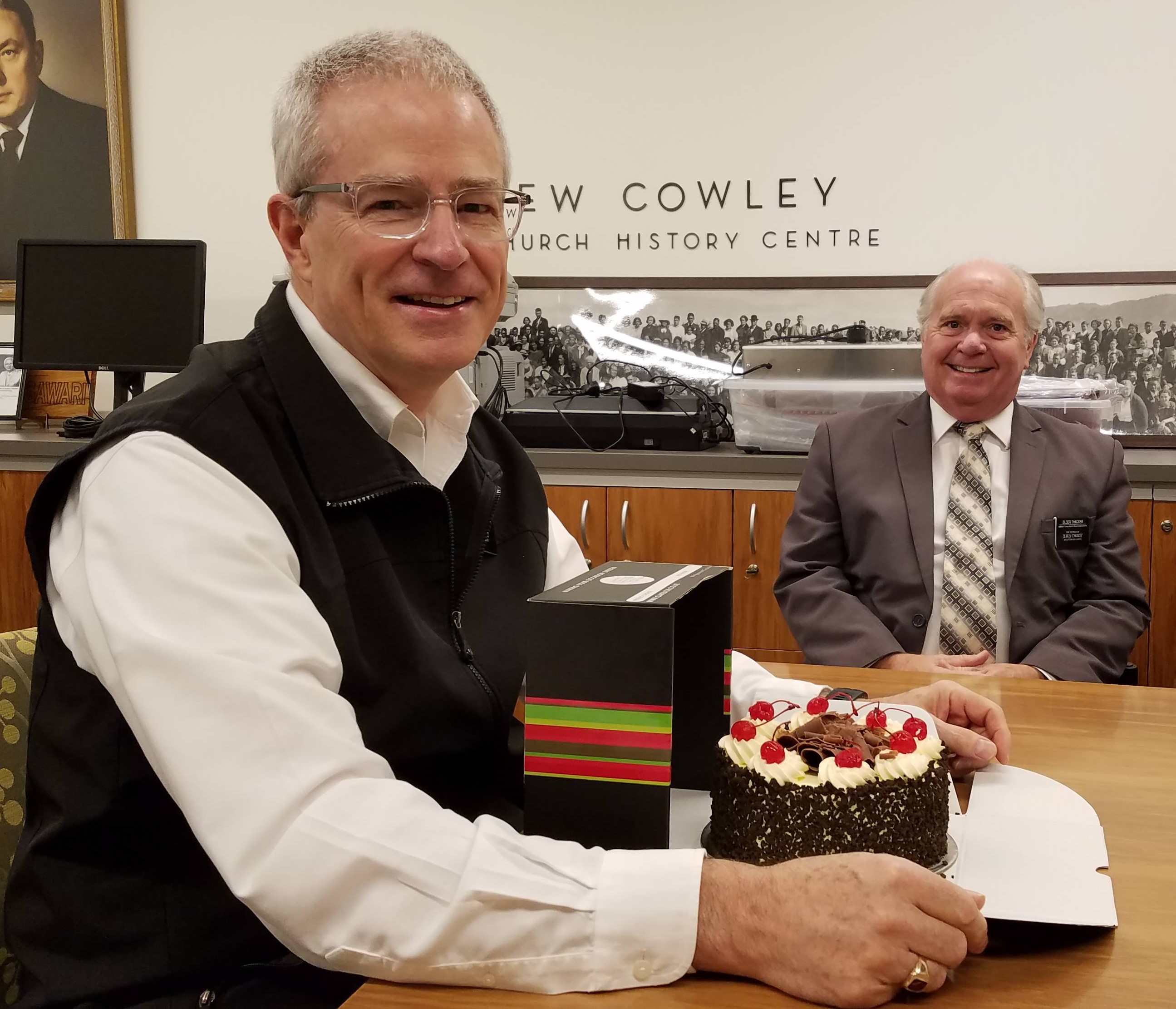
We fit in an early celebration of Michael’s birthday, which will occur on Day 5 of the lockdown. The Black Forest cake was delish
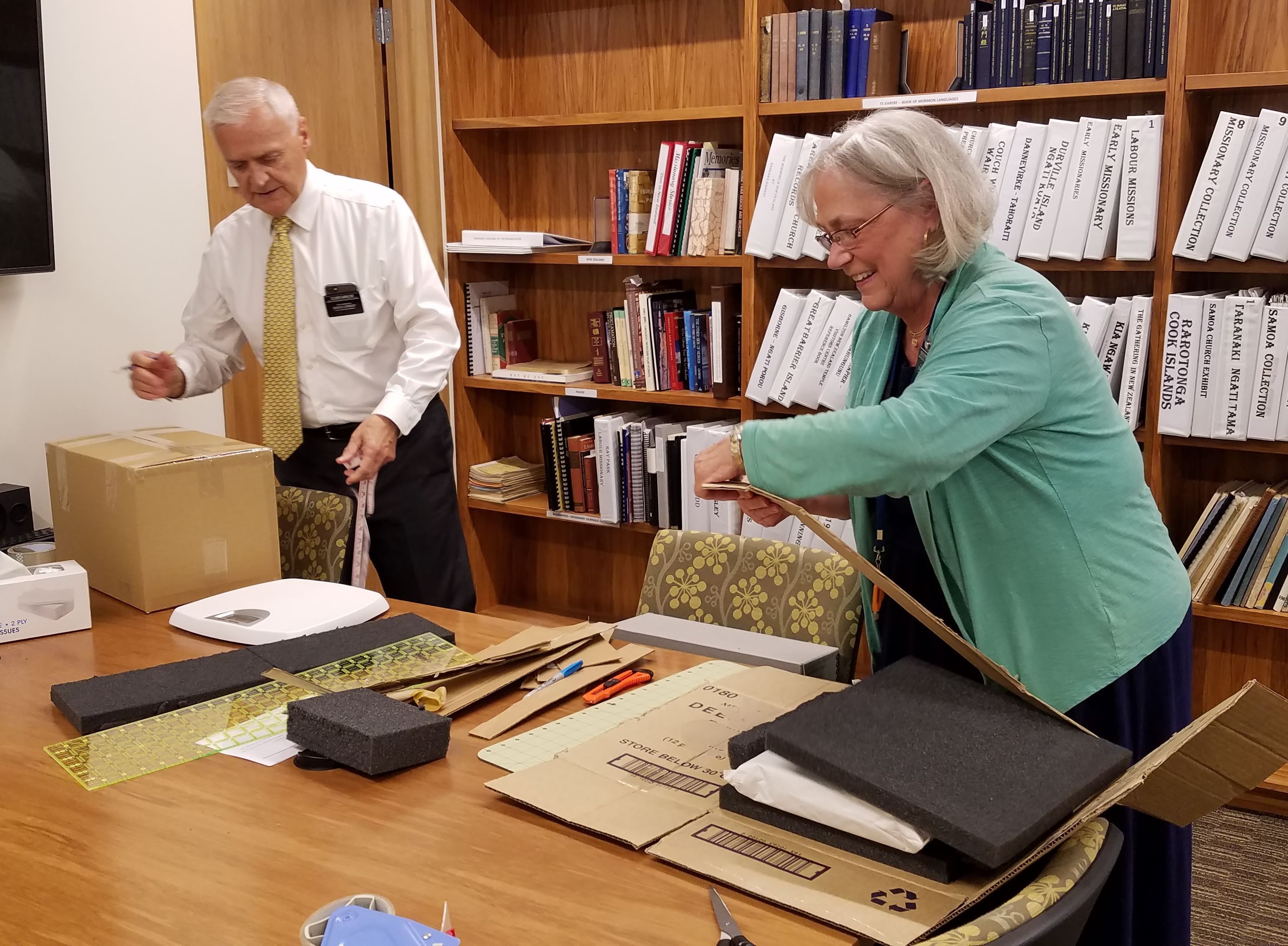
Elder G (Barry) and Sister E (Diane) construct a box to send acquired items to SLC before the Post Shops close
Not long after our virtual planning meeting ended and we had returned to our anxious engagement in figuring out how to proceed, Barry came into the workroom and called for attention. “I just saw the following announcement from Elder [Craig C.] Christensen [the Church’s Utah Area president] on KSL.com, so I think it’s reliable,” he said. He then read a statement outlining the Church’s official return policy for missionaries, putting special emphasis on this quotation: ‘Senior missionary couples all over the world … also will be returning home—unless they are doing essential work like running a mission office…. This change applies to all missionaries serving in a foreign country, except for those in Australia, New Zealand, and some places in Europe.’ So,” Barry went on, “the way I read that is that we’re staying—at least for now.” The workroom erupted in cheers.
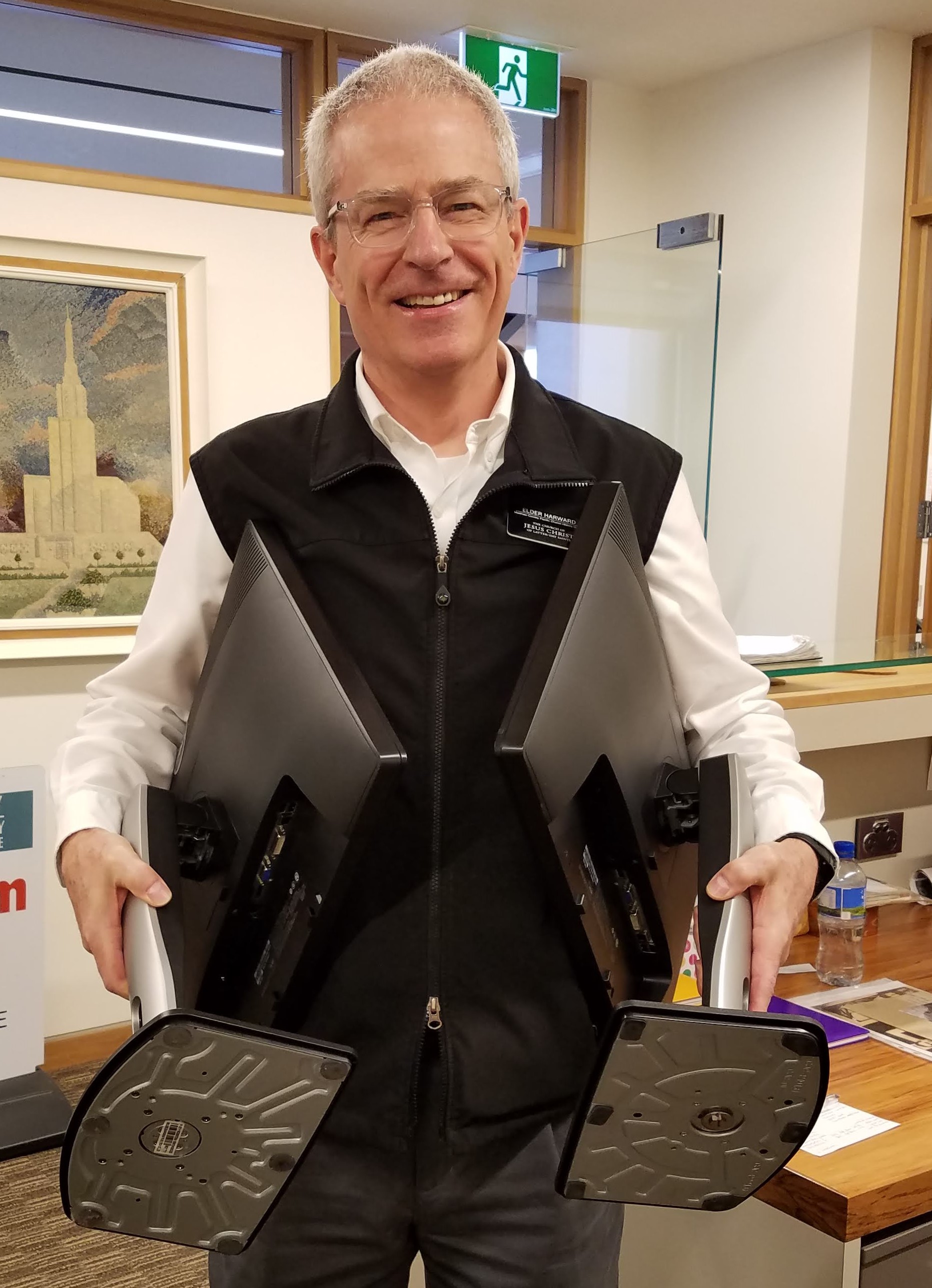
Michael practices curls with monitors
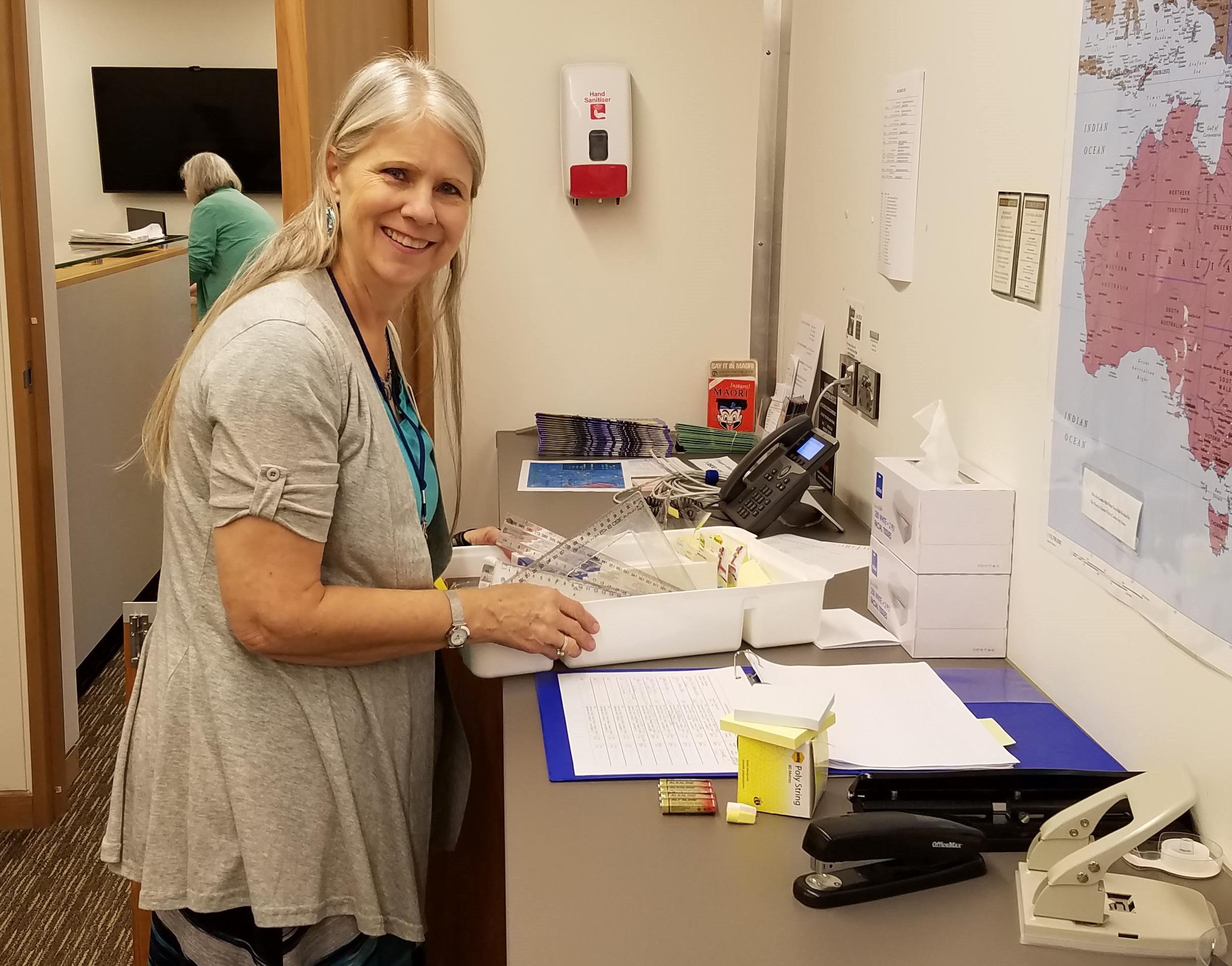
Sister T (Wendy) gathers supplies to use at home
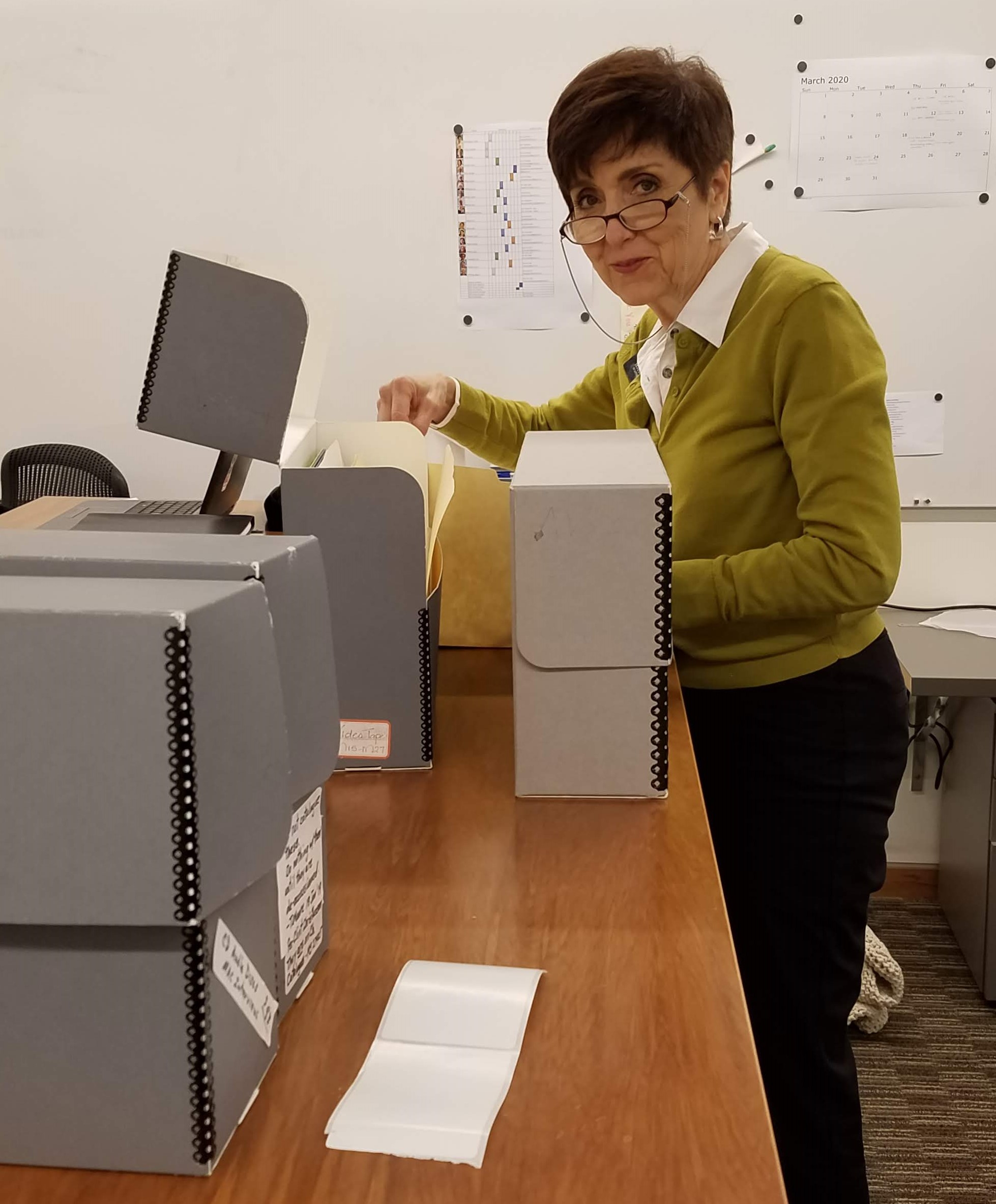
Eva searches through materials that may need to be confined to the archive while we are locked out
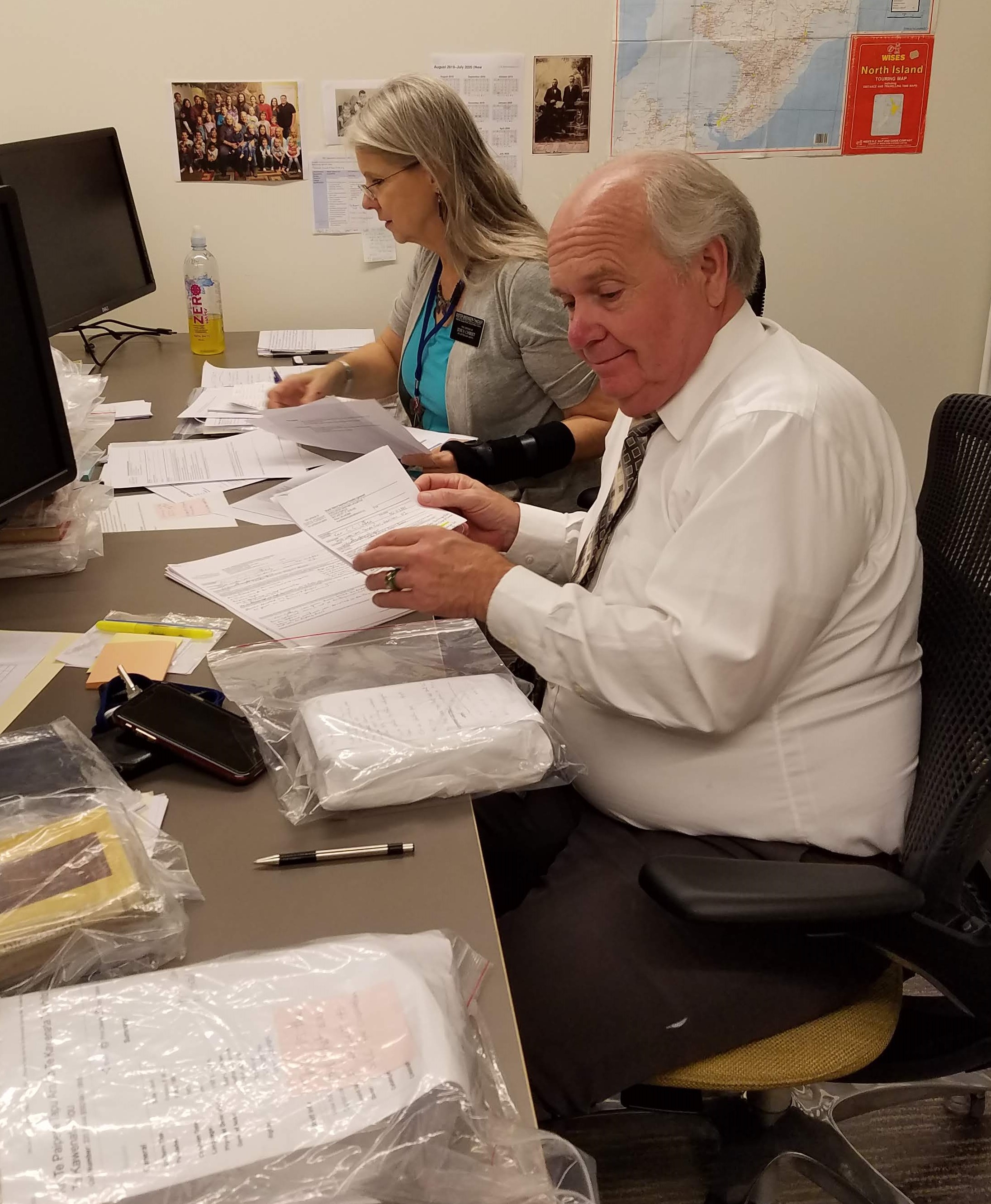
Wendy and Alan bundle up artifacts that still need to be processed
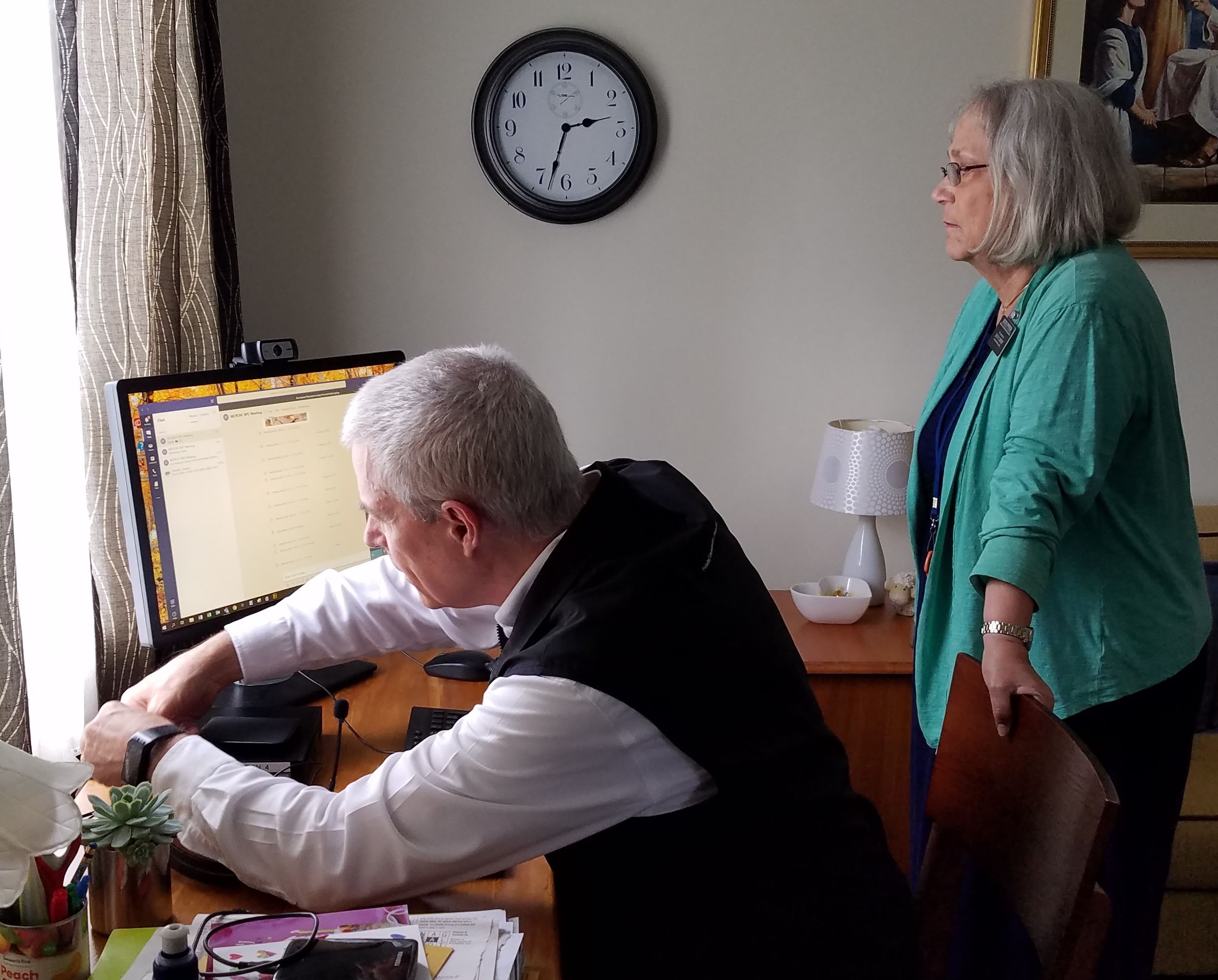
Michael helps Diane set up her work-from-home station
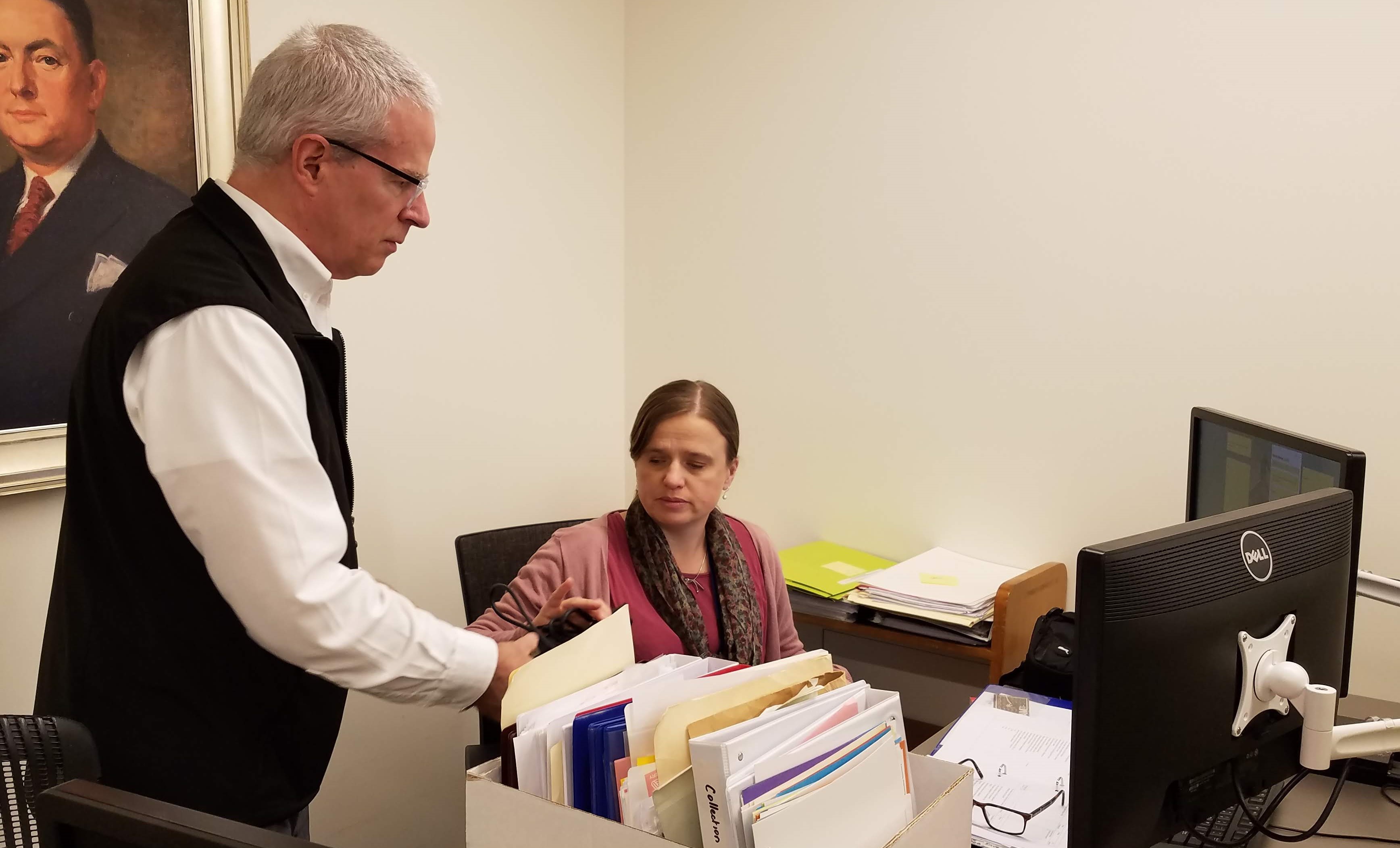
Michael and Catherine (our part-time archivist) discuss what configurations her son will need to set up at her home so she can work from there; she lives too far for Michael to go and help
With that reassurance, but with less than 48 hours before the End of the World as We Know It, we spent the rest of Tuesday and Wednesday finishing or at least stabilizing projects involving materials that cannot be removed from the Centre, and preparing our computer equipment so each of us can continue to work from our flats. We all realized that Michael must have been called to “come to the kingdom for such a time as this” (see Esther 4:14) because without him it would not have been possible—or certainly would have taken much longer—to get each person’s home workstation properly configured and connected to the Church History Department’s virtual private network so we can keep going. He made several trips back and forth to everyone’s flats, setting up equipment and checking broadband capability in each building, and established a new Microsoft Team so the seven of us can continue to hold our daily devotionals and informal discussions virtually.
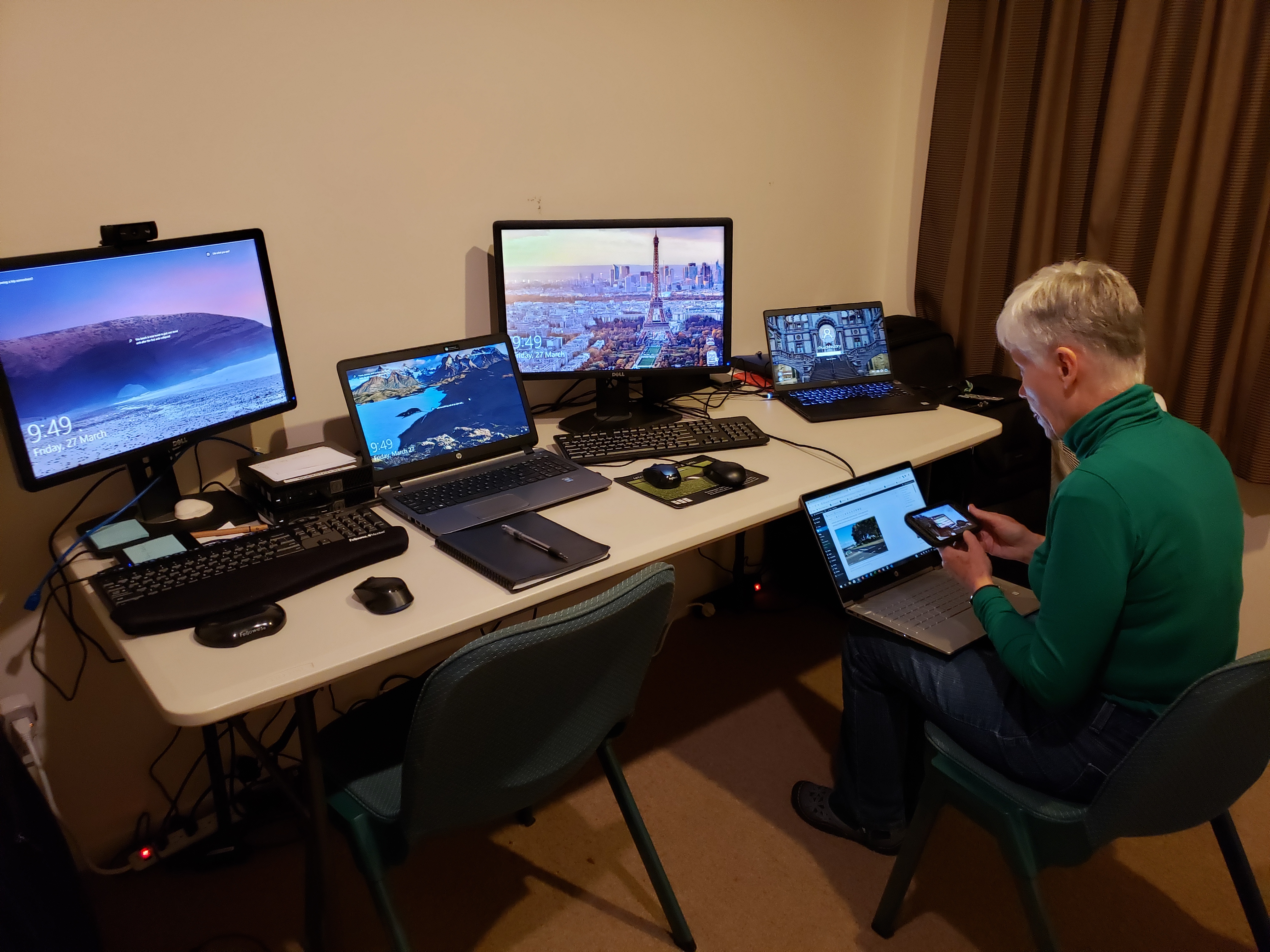
Our home office: 4 bands of wifi, 3 mobile laptops, 2 mini desktops, and a very slow virtual private network
About 4:30 p.m. on Wednesday, when we had done everything we could think of to do, we turned off the lights and left the MCPCHC. Wendy and Alan, who live farthest from the Centre, had already left, but the rest of us were reluctant to head to our separate homes just yet.
“Let’s go out for dinner together while we still can,” Barry suggested. “I think The Helm is still open. We’ll pick you up at ten after five.”
The Helm, a bistro next to Pak ’N Save that we hadn’t tried yet, was not open. Sister E suggested that we try Nando’s, a chain restaurant that appears to be in the same category as O’Charley’s and Ruby Tuesday. Although Nando’s lights were on inside, only the cleaning crew was at work. So we continued cruising the eerily empty streets of downtown Hamilton, looking for any restaurant that hadn’t already shuttered. Just as we were about to give up, we spotted a kebab place with an open door and someone at work behind the counter. Barry stopped to let Michael out so he could determine whether Kebabs Salateen was actually open and not just in the process of shutting down.

Kebabs Fit For Kings (Salateen = Sultans)
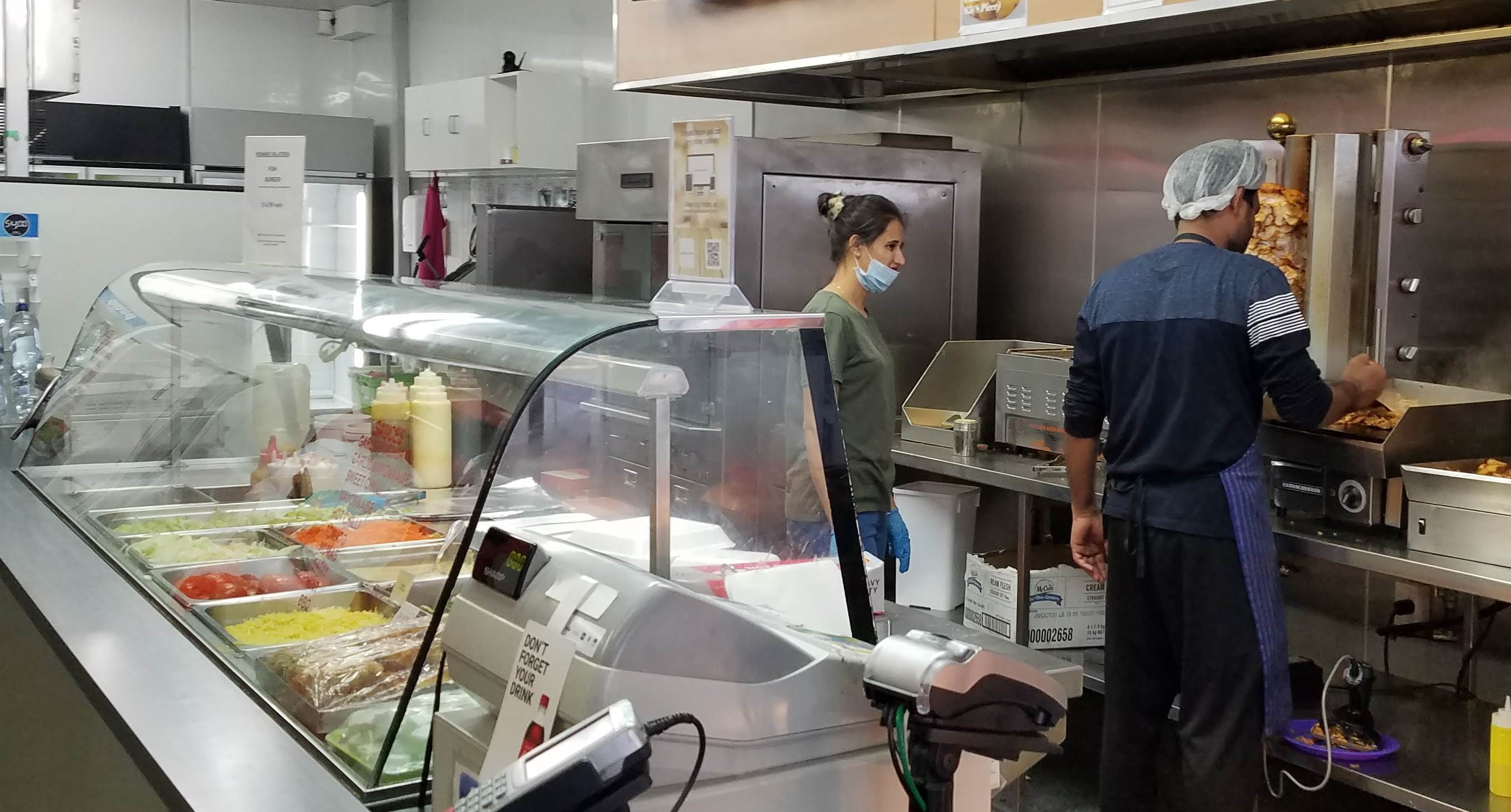
The two-person crew handled everything
“Even if it’s open, take a whiff to make sure it’s safe to eat there,” Eva called after him.
A moment later, Michael was motioning for us to come back. “It’s open, and it smells really good!” he exclaimed. Atypically, we had no trouble finding a parking place.
Mixed kebab (chicken and lamb) was the special of the day, so that’s what we all ordered, except that Barry wanted his atop a pile of chips instead of wrapped in lavash (the mideastern version of a tortilla). We had to wait for about twenty minutes while the cook and the counter girl filled phone orders to be delivered by UberEats, but we passed the time listening to the other customer—a man who might best be described as an old fart—share his opinions about Donald Trump and the fact that the coronavirus pandemic is much less of a problem than global climate change. The friendly proprietor apologized for not offering us a place to sit and eat inside because he had already cleaned and stacked his few chairs and tables, but we had planned to take the food back to Barry and Eva’s house anyway. As our paper-wrapped, personalized packages came out of the foam containers they had been packed in for the trip back to Temple View, Sister E was amused to see that the man who took her order must have looked at the badge that identifies her as a representative of the Church of Jesus Christ of Latter-day Saints instead of asking for her name, because her bag was labeled “Jesus.”
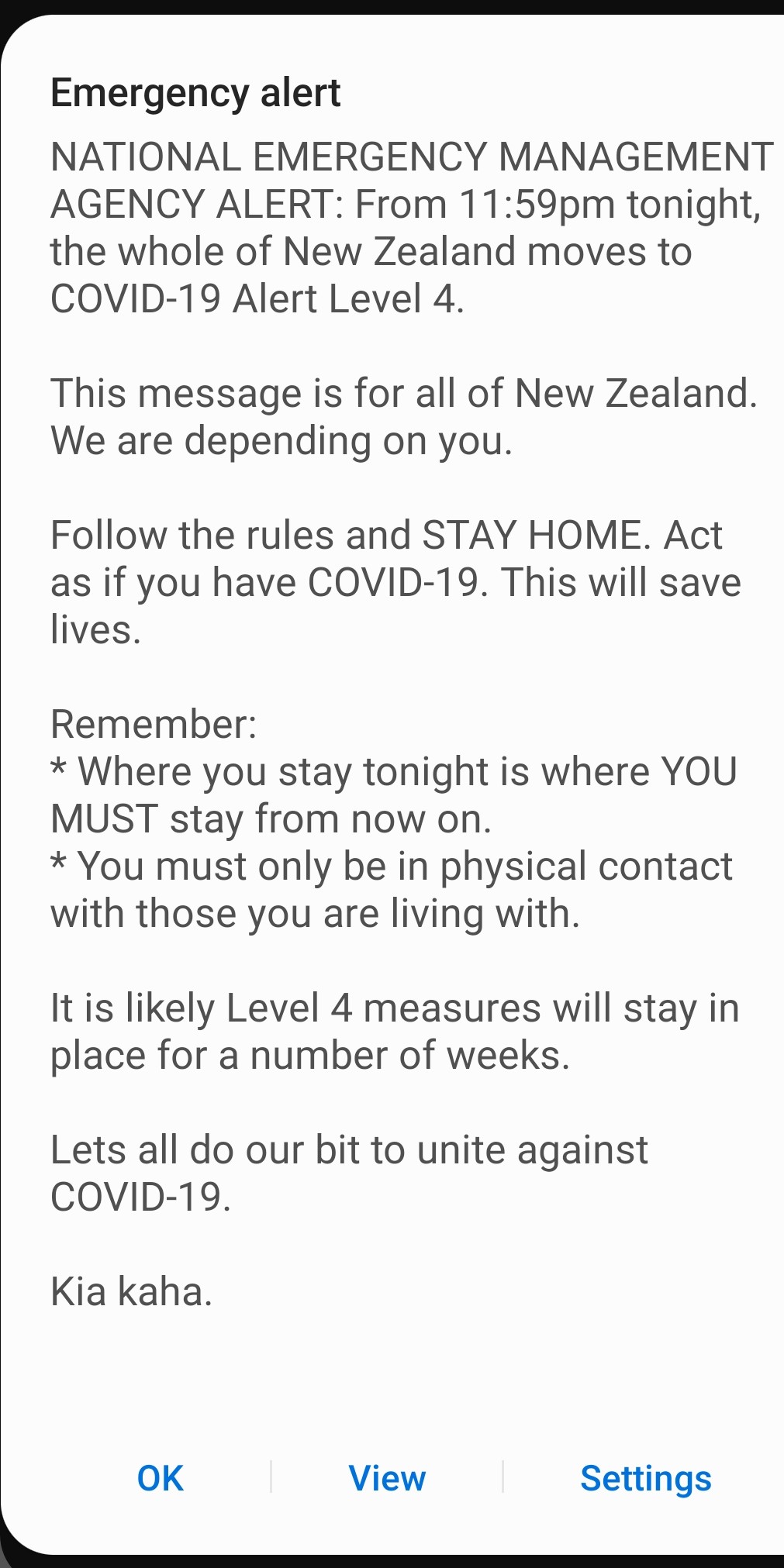
Our game was interrupted by whoops from all five mobile phones, indicating that we had received official notification that the lockdown was about to take effect
Once we had eaten our fill, we cleared the table and played a round of Farkle, a dice game that’s a little like Yahtzee but presents different challenges. Once Eva had managed to edge past Michael for the win, the five of us decided that we still weren’t ready to split up for four weeks, so we went over to the MCPCHC (across the parking lot from the Gs’ house) and logged the laptop in the theatre projection room onto Eva’s Amazon Prime account so we could watch Just Let Go on the big screen. If you haven’t seen this film—a dramatization of the true story of Chris Williams, the Utah man who lost his pregnant wife and two other children when a drunken teenager slammed into their car in 2007—we recommend it. The film focuses on Chris’s struggle to find the right balance between his desire to see justice done and his desire to forgive, and it’s beautifully done. (As Eva commented, “It’s not at all cheesy.”) Chris was an LDS bishop, but the movie avoids any overt references to the Church of Jesus Christ of Latter-day Saints, preferring to identify Chris simply as a Christian minister. As we watched, Nancy was startled to see her friend Kymberly Mellen appear in one scene as a physical therapist, and later realized that Kym’s husband Vance had been one of the screenwriters. It’s a thoughtful, powerful film, and well worth checking out on Amazon Prime or Netflix. It also made a cathartic end to an emotionally exhausting day—and an appropriate opening to what promises to be an emotionally exhausting month.
So glad you didn’t have to make that long journey on a (who knows what germs are in the air?) plane. And that you have plenty to do. We went shopping this morning at “senior hour” (7 a.m.–do they think old people are all up early?) at the grocery store and I was so relieved that they had all the things we needed that I cried when we got home. Yep, the old anxiety is kicking up! So grateful for Alan and friends like you. Keep writing! Your readers want to know about your everyday lives even if they seem boring to you.
Nancy and Michael. Be safe. Take care and bless the work you will accomplish. David and dee
All are safe in our family.
Love reading this, Nancy except it reminds me how much I miss you guys! Stay safe. Pam❤️
There is something so strangely bonding about a pandemic, reading about friends on the other side of the earth trying to find an open restaurant, preparing to hunker down for an indeterminate amount of time, wondering when they will socialize again. How grateful we are for electronic communication! And how fortunate you are to be on a mission where there is plenty to from home. Good luck!